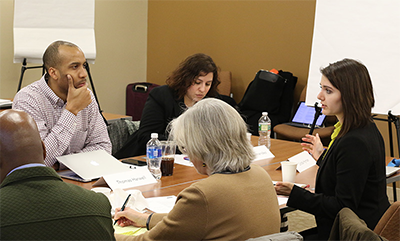Building a Path to Diversity, One School at a Time.
 Hoping to gain clarity and guidance through one of the thorniest issues on college campuses, nearly two dozen faculty and administrators from universities across the Boston area gathered at the School of Public Health on February 2 to share insights and develop methods of promoting diversity.
Hoping to gain clarity and guidance through one of the thorniest issues on college campuses, nearly two dozen faculty and administrators from universities across the Boston area gathered at the School of Public Health on February 2 to share insights and develop methods of promoting diversity.
Moderated by Yvette Cozier, associate professor of epidemiology and assistant dean for diversity and inclusion, the event provided a forum for top advocacy officers to discuss best practices and to solicit new approaches to increase student and faculty representation among under-represented groups.
Michael McClean, associate dean for research and faculty advancement, emphasized the importance for schools to have both a community and a faculty that reflect the broader world. “So much of what affects our research focus is reflected by who is our faculty,” he said. “We also want to make sure that we’re creating a welcoming environment for our students.”
Kenneth Elmore, associate provost and dean of students at Boston University, challenged his fellow attendees to reconsider their approach to fostering diversity and inclusion. “Part of what gives me pause is that we’re so muddled as to why we do this, and continue to be muddled,” he said. “We also discount how important heart is in all this. We’ve metrics-ed ourselves to death, but we’ve forgotten about the people behind the numbers.”
Elmore suggested that the attendees remember the importance of building empathy by building better interpersonal relationships between different groups of people.
Thomas Harwell, director of student diversity and inclusion initiatives at the Questrom School of Business, spoke for a group that discussed scalability of efforts, challenges related to having conversations relating to diversity, the role of white allies, the danger of overcompensating, and the need for balance.
“We talked about the realization that our students are having tough experiences on campus and are suffering, there’s a need to help them,” Harwell said. The group also discussed the “BU Bounce,” named for the unfortunate tendency of minority students to leave BU after a year or two, citing lack of community.
Peter Cahn, associate provost for academic affairs at the MGH Institute of Health Professions, was part of a group addressing faculty diversity and how faculty searches can be made more inclusive. One way, the group suggested, might be with an academic version of the NFL’s “Rooney Rule,” which actively aims to increase the number of head coaches of color by increasing the number of potential candidates.
“There’s also the need to speak the same language as faculty and present data, to know how many minority doctorate students are out there, and keep them in the pipeline so that they are recognized when openings come up,” Cahn said.
Hee-Young Park, assistant dean for graduate medical sciences at the School of Medicine, discussed holistic admissions—when a broad spectrum of criteria are considered when admitting applicants, not just test scores. Some schools are considering dropping GRE requirements, Park said, while others are resistant to it. She is currently writing a paper based, in part, on findings at MED that suggest GRE scores are not an absolute predictor of passing grades in graduate school, but have more of a correlation when looking at top students.
Maria Madison, associate dean for diversity, equity and inclusion at Brandeis University, welcomed Park’s approach and encouraged other attendees to seek data to challenge deans or provosts who believe they must keep their US News and World Report scores high by only seeking top-scoring students.
Several administrators echoed the frustration of Samantha Kaplan, director of the Early Medical School Selection Program at MED, who acknowledged the widely loathed but unavoidable connection between MCAT scores and US News rankings.
Crystal Ann Williams, associate provost for diversity and inclusion at Boston University, remarked, “As we aspire to go up in the rankings, as we aspire to become more selective, there’s a tension about not only how many people we admit, but who we admit.”
Ariana Hajmiragha, administrative coordinator of the Office of the Dean of the Graduate School of Arts and Sciences at Tufts University, acknowledged the seriousness of the task of fostering diversity, and suggested schools should spread the workload among different administrators and faculty.
There was near universal agreement of a suggestion that the attendees should be at the forefront of a cohort to help fight the perception of Boston as not being as welcoming and diverse as other cities, a factor that might play into the decisions of some students not to apply or attend Boston schools.
“There are some of us who have been in Boston for 40 or 50 years, and we’re able to navigate it and make it work. I’d like to see some more of those stories—especially for students,” Elmore said. “I have a desire to have more students, especially students of color, to stay here.”